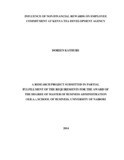| dc.description.abstract | The study aimed to investigate the influence of non financial rewards on employee
commitment at Kenya Tea Development Agency. The research design adopted was
descriptive survey design. This consisted of all the employees of Kenya Tea
Development Agency who were based at the agency headquarters. The population of
interest was 294. The researcher used stratified sampling because of ease of classifying
the population into strata‟s. The sample comprised of 30% from each strata of the target
population hence sampled to 90. The study used primary data that is collected through
self-administered questionnaires containing both open ended and closed questions. The
data collected was analyzed using descriptive statistics. Data was analyzed using
statistical package for social sciences based on the questionnaires. Results were presented
in tables and charts. The study found that the employees agreed that they were provided
with medical treatment to a moderate extent. The study found that, career advancement
would improve their job to a great extent. The study also found that, the organization
released employees from regular work to attend training and even sponsored employees
where possible to a great extent .The study also found that, they were being praised and
recognized in public for good work to a great extent. The study concludes that career
development, development opportunities offered and employee recognition are the tools
that management can use to motivate employees in order for them to perform effectively
and efficiently. The study also concludes that employees of KTDA place great value on
different rewards given to them and this promoted their level of commitment. It is
therefore concluded that workers place great value on the different non- financial rewards given to them by their employers. The results of this investigation could be of benefit to
managers and policy makers. The study recommends that since career development
influenced employees‟ commitment, organizations would be interested in providing
opportunities for career development. Institutions such as KTDA have an increasingly
competitive operating environment, so by revising their non-monetary reward policies it
may lead to a positive influence on employee commitment; this will in turn improve
retention and performance | en_US |

